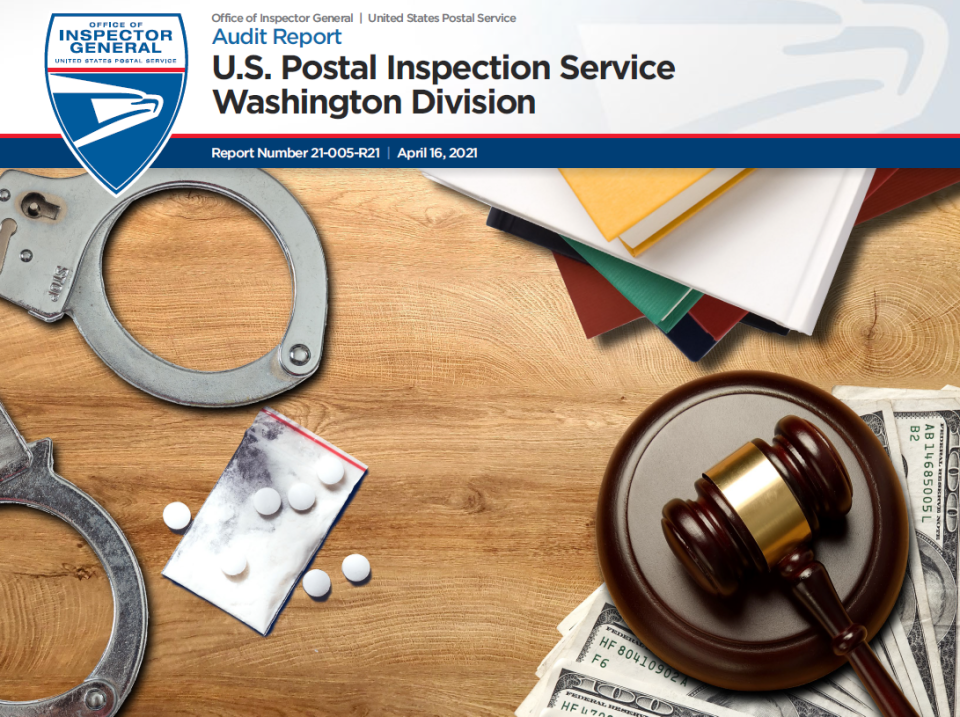U.S. Postal Inspection Service Washington Division
Objective
Our objective was to determine whether the Postal Inspection Service, Washington Division, implemented effective controls for case management, accountable property, and training.
Based on a fiscal year (FY) 2020 risk analysis of closed, jacketed cases, case workhour data, the number of hotline referrals, and National Compliance Review occurrences, we selected the Washington Division for review. A jacketed case is opened when there is an indication or occurrence of criminal activity warranting further investigation.
The mission of the Postal Inspection Service is to support and protect the U.S. Postal Service and its employees, infrastructure, and customers; enforce the laws that defend the nation’s mail system from illegal or dangerous use; and ensure public trust in the mail. Postal inspectors are federal law enforcement agents responsible for enforcing more than 200 federal statutes that concern the Postal Service and the U.S. mail.
Postal inspectors use the Case Management System (CMS) database to document and track case activities. The Property Evidence Acquisition Program in CMS tracks property and evidence obtained during investigations. Postal inspectors are also assigned accountable property, such as firearms and vehicles, to perform their work.
The Washington Division has 79 postal inspectors and 60 postal police officers. In FY 2020, the Washington Division closed 203 jacketed cases. We reviewed a random sample of 60 jacketed cases that were closed in FY 2020.
Findings
The Washington Division ensured that all postal inspectors and postal police officers met all required firearms and threat management training. However, we found inconsistencies in employees following case management and accountable property policies.
Washington Division Postal inspectors did not issue required Inspection Service Communications (ISCOM) for 11 of 25 cases (44 percent) in FY 2020. These electronic communications describe investigative activities and inform headquarters of ongoing and completed field investigations. Postal Inspection Service policy requires ISCOMs to communicate case-specific information of a priority nature and only for investigative matters meeting specific criteria. The absence of ISCOMs occurred because postal inspectors’ and team leaders’ interpretations of the requirements for issuing ISCOMs for significant events were inconsistent with current policy. When ISCOMs are not sent, this could result in National Headquarters not being aware of significant ongoing and completed field investigations. In addition, information in ISCOMs can assist investigators in other divisions and help develop and track trends. Without sufficient communication, postal inspectors may not be equipped with the factual information needed to investigate cases.
In addition, postal inspectors did not attach required field notes for 14 of 40 cases (35 percent). Postal Inspection Service policy requires postal inspectors to prepare field notes to document all significant matters that occur in an investigation. This occurred because management stated that some cases don’t require field notes and postal inspectors can use a Memorandum of Interview template instead. In addition, rather than attaching field notes, some postal inspectors entered these notes directly into investigative details in CMS, resulting in inconsistent use of field notes.
A postal inspector’s field notes can be used in court proceedings during testimony. However, when postal inspectors are not adequately documenting investigative activities through field notes, they risk relying on alternative documentation when testifying to recall events that occurred months or, sometimes, years ago, which could affect their testimony.
Postal inspectors also did not consistently retain all required documents or maintain fully operational equipment in law enforcement vehicles. Specifically, we found that:
- While 18 of 19 (95 percent) postal inspectors properly completed their long-term home-to-work vehicle authorizations, one of 19 (5 percent) did not have an active authorization.
- Two of 20 (10 percent) vehicles did not have current vehicle registrations.
- Two of 20 (10 percent) vehicles had two-way mobile radios which were unable to reach the Inspection Service communication network.
These issues occurred because of management’s lack of timely corrective action on vehicle requirements. During the audit, management took corrective action by issuing a reminder to all Washington Division inspectors to follow safety requirements when operating a vehicle, obtaining current vehicle registrations, and repairing two-way mobile radios to address these issues; therefore, we are not making recommendations on these issues.
While 62 of 64 (97 percent) pieces of high-value evidence were verified, the disposal of two pieces of cash evidence, valued at $30,000 and $6,000, was not accurately recorded in the evidence system. This occurred because the cash evidence was deposited into the Inspection Service forfeiture holding account, but the general analyst did not properly record the disposal of evidence in the system. Further, the evidence control officer’s physical inventory of high-value evidence which might have identified this issue was not required in FY 2020 due to COVID-19. When high-value evidence is incorrectly recorded, a subsequent verification could determine if a potential loss or mishandling of the listed evidence has occurred. The general analyst took corrective action by verifying that the disposals of the cash evidence were properly recorded; therefore, we are not making a recommendation on this issue.
Finally, an Inspection Service operations technician did not maintain individual control over spare evidence keys. This occurred because management had no formal key security protocol in place for spare evidence keys. Lack of controls around the issuance of spare evidence keys may result in theft, tampering, or misuse of secured evidence.
During the audit, management took corrective action by creating a memorandum titled Washington Division DHQ Evidence Key Security Protocol, which outlines the new controls around the spare evidence keys and the roles and responsibilities of the evidence key custodian. Therefore, we are not making a recommendation on this issue.
Recommendations
We recommended management review and update Case Management Reporting Guidelines and the Inspection Service Manual with current Inspection Service Communications requirements and define what constitutes a field note and when it is required.
Additionally, we recommended management create a process to ensure that all vehicle long-term home-to-work authorizations are current.

